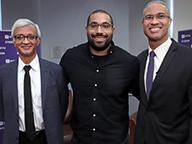Faculty News
—
Professor Arun Sundararajan offers insights on the potential regulation of social media platforms after Facebook's Cambridge Analytica scandal
—

Excerpt from TV Globo -- "They are country like rather than company like..."
Faculty News
—

Excerpt from TV Globo -- "They are country like rather than company like..."




















